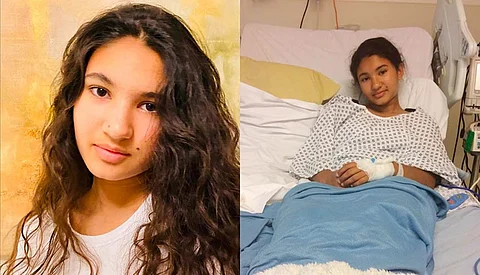

“Please join the stem register to help me and all the other people of Indian origin who need a stem cell transplant. I know a match is out there and I won’t give up hope,” says 12-year-old Arya Lloyd, who is suffering from a blood disorder which requires a transplant.
Her parents – father Geraint Lloyd, a consultant surgeon, and mother Brundha Lloyd, a dentist originally from Hyderabad in India – have launched a worldwide campaign to find a stem cell donor for their little girl in a bid to save her life after the Covid-19 lockdown dramatically cut down the number of donors coming forward.
Arya, who lives with her family in Cambridge, also aspires to be a surgeon like her father in order to help people who are unwell when she grows up.
Her life changed when she first complained of stomach pains in May this year. At first her parents did not take it too seriously but when the pains refused to go away, Arya was referred to St. Mary’s Hospital in Paddington, London, where she was diagnosed with Aplastic Anaemia, an extremely rare condition. Doctors believe her best chance of survival is through a blood stem transplant with a 100 per cent donor match. Often, a patient’s first route is from a transplant from a sibling. However, as an only child, this option isn’t available to Arya.
“The response in the UK has been brilliant. Lots of people have joined the stem cell register but we need many more and especially people of Indian origin to help Arya and all the other people of Indian origin who need a stem cell transplant,” urges Arya’s father.
Aplastic Anaemia is an extremely rare disease that affects about two in 1,000,000 people in the UK. The bone marrow failure condition means Arya’s bone marrow does not produce the red blood cells, white blood cells, and platelets that she needs to survive. Being of mixed heritage with an Indian mother and Caucasian father, means finding a perfect match donor is a particular challenge.
“A matched stem cell donation would allow Arya to be cured. It would save her life and allow her to lead a normal life,” says Geraint Lloyd, who is urging people of Indian heritage to come forward.
“At the moment there are not enough people on the stem cell register. This is particularly true of people of Indian origin. It is very difficult for people of Indian or mixed-race origin to find a stem cell match, so it is very important that more people in India join the DKMS or Datri stem cell register. There are many thousands of people who need a stem cell transplant but don't have a matching donor.”
DKMS is an international blood cancer charity, who are working with the family on the campaign.
“Currently 7 per cent of people on DKMS’ UK database are of Indian origin and 0.6 per cent of people are mixed white British/India. Arya’s ‘genetic twin’ – a perfect stranger whose genetic profile is identical to hers will come from someone from the same ethnic background, so we’re asking people of Indian heritage to step forward,” a charity statement said.
DKMS, which defines its mission as “we delete blood cancer”, are urging more people to come forward and register, especially as at the start of the Covid-19 pandemic the charity recorded a 50 per cent decrease in such registrations.
In reference to the actual procedure involved, the charity explains its safety and accessibility for donors as an opportunity to give someone else a second chance of life by donating some of your blood stem cells in one of two ways.
“Around 90 per cent of all donations are made through a method called peripheral blood stem cell (PBSC) collection. This method is very similar to giving blood. It involves blood being taken from one of the donor’s arms and a machine separates the blood stem cells from it. The donor’s blood is then returned to them through their other arm. This is an outpatient procedure that is usually completed in four to six hours.
“In just 10 per cent of cases, donations are made through bone marrow collection. Bone marrow is taken from the pelvic bone under general anaesthetic and the procedure lasts around an hour.”
Arya’s campaign is being supported by British Indian actress Priya Davdra, who is working with DKMS to urge more people, particularly those from South Asian communities, to sign up as potential blood stem cell donors.
Davdra said: “It broke my heart when I heard about Arya’s situation. To think what she and her family must be going through is just so awful. But the fact is there is something we can all do to help. And that something is just so simple.
“Hearing stories of families in such desperate need, along with the shockingly low numbers of registrations from the Asian community, made me realise I needed to do something to help. So I registered as a potential lifesaver with DKMS. I am honoured to be a DKMS Ambassador and to lend my voice to Arya’s campaign in the hopes we can find her, and the many people like her, a lifesaving donor.”
So far over 7,000 have registered with DKMS following Arya’s public appeal, but a match hasn’t been found yet.
*To find out more and/or register as a potential stem cell blood donor, click here